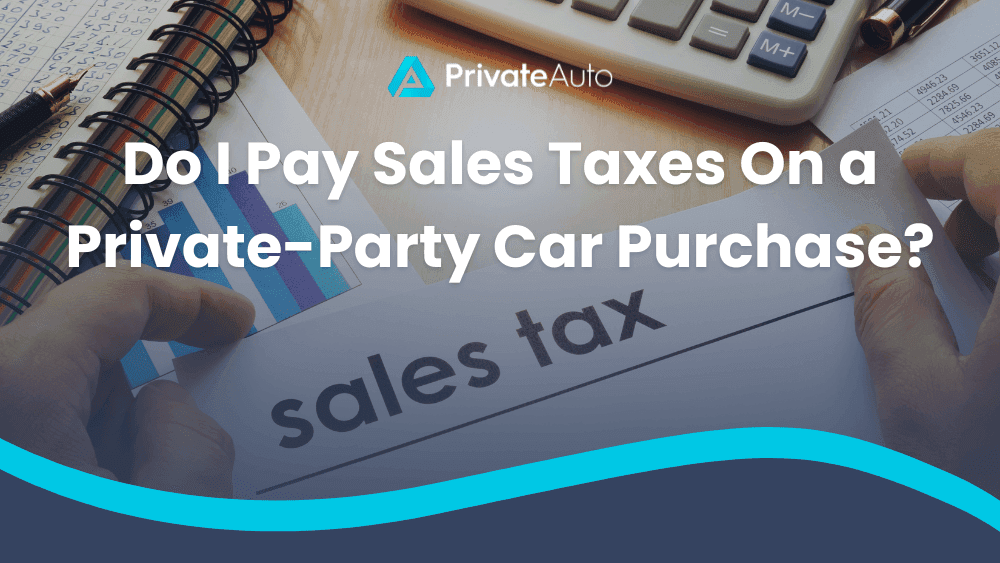Do I Pay Sales Taxes On a Private-Party Car Purchase?
Unless you are purchasing and registering a vehicle in a tax-free state, you will have to pay some form of vehicle sales tax. Except for three states (see below), tax law does not differentiate between private-party and dealership sales.
In addition to state sales tax, you’ll probably also owe additional taxes and fees related to registration, license plates, title transfer, and city or county taxes.
Which States Have No Sales Tax?
Five states don't charge sales tax on vehicle purchases, at least on a state level. Individual counties and municipalities may still levy taxes in these states.
1. Alaska
2. Delaware
3. Montana
4. New Hampshire
5. Oregon
1. Alaska
2. Delaware
3. Montana
4. New Hampshire
5. Oregon
No-Tax Tax States
Some states claim to have no sales tax as an exercise in semantics. For example, Delaware charges a "motor vehicle document fee" that is calculated as a percentage of the purchase price, making it a sales tax in all but name.
Tax Exemptions for Private-Party Sales
Three states—Hawaii, Arizona, and Nevada—charge sales tax on dealership vehicle sales but not on private party sales. This is a huge incentive to buy privately, on top of all the other advantages of private-party transactions.
The Benefits of Purchasing from a Private Party
We're big fans of the private seller route, and we’ve built a set of self-serve tools to make the process easier. Here’s why it’s better to buy from a private seller instead of a dealer:
1. You drive the deal on your terms. PrivateAuto allows you to make offers and negotiate the best deal directly with the seller.
2. Get a better price by cutting out the middleman and going straight to the source. Dealers must buy low and sell high to make a profit and keep the lights on. You don’t need to fund them.
3. Avoid dealer fees. Car dealerships charge documentation fees that range from $50 to over $1,000.
4. Enjoy security and convenience when you do the deal with PrivateAuto. Our transactional marketplace gives dealer-like convenience in the palm of your hand. From scheduling the test drive to sending instant payments, you’ll love how easy the process is.
5. In Hawaii, Arizona, and Nevada, as we’ve noted, private-party sales are exempt from state sales taxes, whereas dealership sales are taxed.
1. You drive the deal on your terms. PrivateAuto allows you to make offers and negotiate the best deal directly with the seller.
2. Get a better price by cutting out the middleman and going straight to the source. Dealers must buy low and sell high to make a profit and keep the lights on. You don’t need to fund them.
3. Avoid dealer fees. Car dealerships charge documentation fees that range from $50 to over $1,000.
4. Enjoy security and convenience when you do the deal with PrivateAuto. Our transactional marketplace gives dealer-like convenience in the palm of your hand. From scheduling the test drive to sending instant payments, you’ll love how easy the process is.
5. In Hawaii, Arizona, and Nevada, as we’ve noted, private-party sales are exempt from state sales taxes, whereas dealership sales are taxed.
How Is Car Sales Tax Calculated?
A lot of states, counties, and cities charge taxes whenever you purchase a car. Depending on where you live, you may owe sales tax to your state, your municipality, your county—or all three.
Sales tax is calculated as a percentage of the vehicle's purchase price. Some people think they can outsmart the government by negotiating a low "official" purchase price and paying the rest in a side transaction. But the government can’t be fooled so easily.
If the government suspects that the purchase price of the vehicle was artificially decreased, it will calculate sales tax based on the car’s fair market value.
The government establishes what the car is worth on the open market by referring to Kelley Blue Book or other reliable sources on used car prices. If they conclude that the car's fair market value is greater than its purchase price, they can opt to base sales tax on the fair market value.
It is important to note that underreporting the purchase price of a vehicle to avoid paying sales tax is illegal. If you are caught doing this, you could be subject to a fine of up to $5,000.
Sales tax is calculated as a percentage of the vehicle's purchase price. Some people think they can outsmart the government by negotiating a low "official" purchase price and paying the rest in a side transaction. But the government can’t be fooled so easily.
If the government suspects that the purchase price of the vehicle was artificially decreased, it will calculate sales tax based on the car’s fair market value.
The government establishes what the car is worth on the open market by referring to Kelley Blue Book or other reliable sources on used car prices. If they conclude that the car's fair market value is greater than its purchase price, they can opt to base sales tax on the fair market value.
It is important to note that underreporting the purchase price of a vehicle to avoid paying sales tax is illegal. If you are caught doing this, you could be subject to a fine of up to $5,000.
Can I Avoid Paying Sales Tax?
You can't get around paying sales tax by driving to a state that doesn't have it and buying a car there. Unless you're buying your used car in a state that doesn't charge sales tax on cars, you'll have to pay sales tax in some manner when you buy from a private seller.
States require that you pay sales tax on your car when you register it, regardless of where you purchased it. Most states have reciprocal agreements with neighboring states, so you will still be required to pay sales tax if you live in a state with sales tax and purchase a car in a state without.
Say you live in Washington State and you drive to Oregon to purchase a used vehicle from a private party. Buying a car in Oregon does not get you around paying Washington sales tax once you go to register it in Washington.
Some states annually charge a personal property tax based on your car's current value. Some cities in the United States also tax vehicle owners annually. For instance, if you live in Boston, your yearly excise tax for a car worth $25,000 would be $650, or $25 for every $1,000. This is on top of the auto sales tax charged by the state of Massachusetts.
You'll need to follow the tax laws applicable to the state in which you register the vehicle. When you purchase from a dealership, taxes are due before the car leaves the lot. You'll pay sales tax in a private party sale when you register your new-to-you vehicle.
States require that you pay sales tax on your car when you register it, regardless of where you purchased it. Most states have reciprocal agreements with neighboring states, so you will still be required to pay sales tax if you live in a state with sales tax and purchase a car in a state without.
Say you live in Washington State and you drive to Oregon to purchase a used vehicle from a private party. Buying a car in Oregon does not get you around paying Washington sales tax once you go to register it in Washington.
Some states annually charge a personal property tax based on your car's current value. Some cities in the United States also tax vehicle owners annually. For instance, if you live in Boston, your yearly excise tax for a car worth $25,000 would be $650, or $25 for every $1,000. This is on top of the auto sales tax charged by the state of Massachusetts.
You'll need to follow the tax laws applicable to the state in which you register the vehicle. When you purchase from a dealership, taxes are due before the car leaves the lot. You'll pay sales tax in a private party sale when you register your new-to-you vehicle.
How to Finalize Ownership of a Used Car?
After buying the car and paying the sales tax, you still have a few things to do. You'll need to finalize your ownership of it with your state's Department of Motor Vehicles (DMV) or equivalent organization.
The previous owner will have signed the title over to you when you purchased the car. Now you need to finalize the title transfer with your state. At the same time you do so, you will register the car in your name and get new plates.
Here are some of the most commonly required documents that a state's DMV will require:
Paperwork requirements will vary from state to state, but you should expect to bring the following documents:
1. Valid driver's license
2. Proof of auto insurance
3. A bill of sale
4. Completed certificate of title
5. Emissions test certificates
6. A completed registration form
In most states, you will have 30 days to register the car.
Looking to sell your car? Create a listing on PrivateAuto and connect with interested buyers today!
The previous owner will have signed the title over to you when you purchased the car. Now you need to finalize the title transfer with your state. At the same time you do so, you will register the car in your name and get new plates.
Here are some of the most commonly required documents that a state's DMV will require:
•
A completed vehicle title transfer and registration application form
•
Proof of auto insurance
•
Proof of identity (driver’s license or government-issued ID card)
•
Bill of sale—done through the PrivateAuto mobile app with e-signatures
•
The original title (or a duplicate title, if the original one had gotten lost)
•
An odometer disclosure statement—required by some states
•
A highway safety inspection—required by some states
•
Payment for your state’s car sales tax, if applicable
Paperwork requirements will vary from state to state, but you should expect to bring the following documents:
1. Valid driver's license
2. Proof of auto insurance
3. A bill of sale
4. Completed certificate of title
5. Emissions test certificates
6. A completed registration form
In most states, you will have 30 days to register the car.
Looking to sell your car? Create a listing on PrivateAuto and connect with interested buyers today!
Car Taxes FAQ
Do you have to pay taxes on a used car in Nevada?
When you buy from a Nevada dealership, you'll owe Nevada’s 4.6% sales tax—but not when you buy from a private seller.
Regardless of whether you purchase from a dealer or private party, you’ll owe other taxes and fees, including car registration, auto insurance, and car title fees when you purchase a car in Nevada.
Many counties offer discounts on car registration fees for seniors and military members. You can also use fuel tax credits if you drive an alternative fuel vehicle.
Regardless of whether you purchase from a dealer or private party, you’ll owe other taxes and fees, including car registration, auto insurance, and car title fees when you purchase a car in Nevada.
Many counties offer discounts on car registration fees for seniors and military members. You can also use fuel tax credits if you drive an alternative fuel vehicle.


